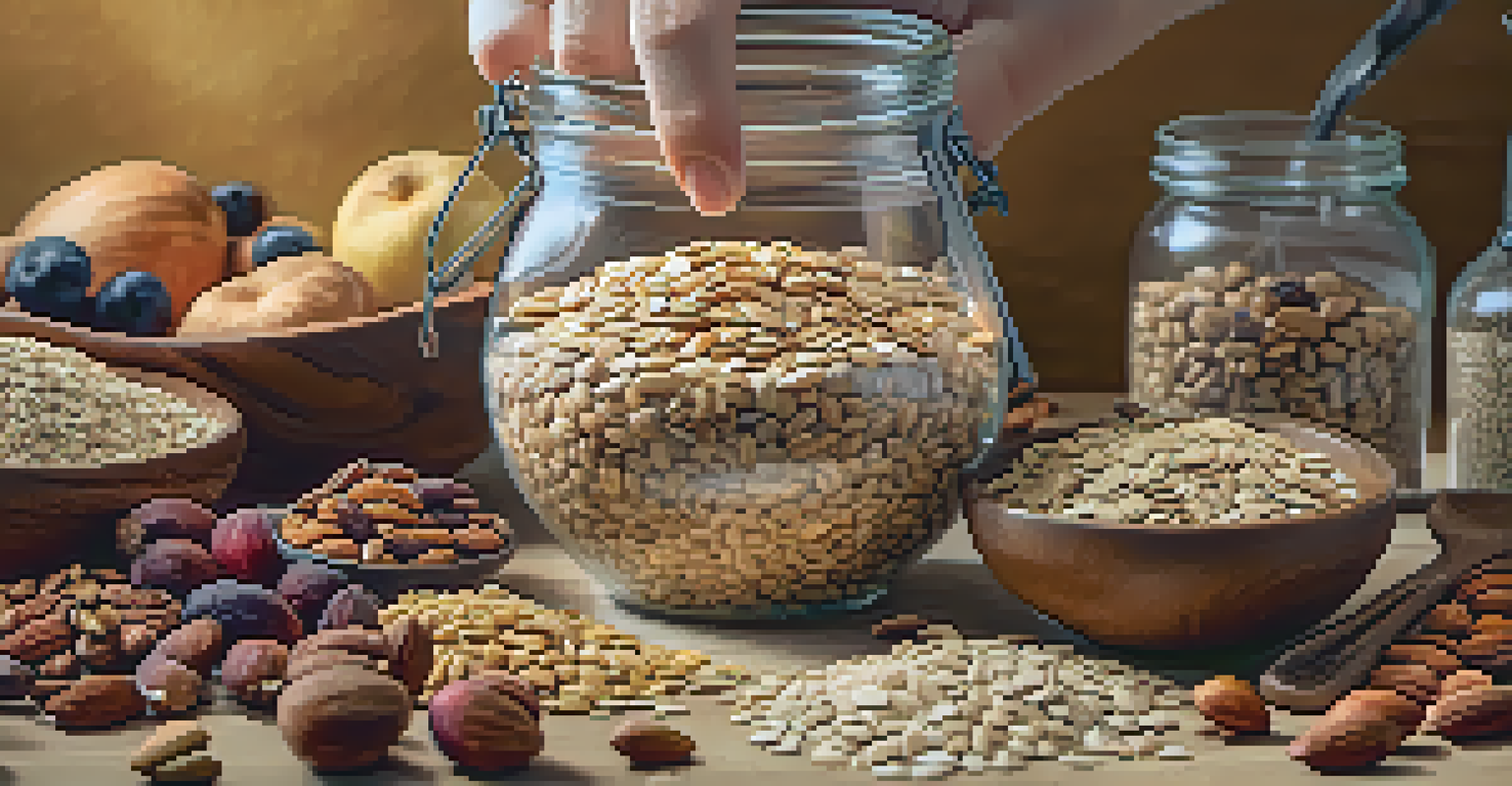The Role of Dietary Fiber in Healthy Aging Strategies

What is Dietary Fiber and Why is it Important?
Dietary fiber is a type of carbohydrate that our bodies can't digest. Unlike other carbs that break down into sugar molecules, fiber passes through the digestive system relatively intact, offering a range of health benefits. It plays a crucial role in maintaining digestive health, which is especially important as we age.
Let food be thy medicine and medicine be thy food.
Fiber comes in two forms: soluble and insoluble. Soluble fiber dissolves in water and can help lower blood cholesterol levels, while insoluble fiber adds bulk to stool, facilitating regularity. Both types are essential for a balanced diet and can significantly influence our health as we grow older.
Incorporating fiber-rich foods like fruits, vegetables, whole grains, and legumes into your daily meals can promote overall wellness. As we age, a high-fiber diet can help fend off various health issues, making it a key component of a healthy lifestyle.
How Dietary Fiber Supports Digestive Health
Aging can often bring about changes in our digestive system, leading to issues like constipation or irritable bowel syndrome. Dietary fiber plays a vital role in preventing these problems by promoting regular bowel movements and ensuring a healthy gut. This is particularly important for seniors who may experience slower digestion.

By increasing the bulk and softness of stools, fiber helps reduce the risk of constipation—a common complaint among older adults. Regular consumption of fiber can also support the growth of beneficial gut bacteria, which contributes to a healthier microbiome. A healthy gut is crucial, as it influences everything from nutrient absorption to immune function.
Fiber Enhances Digestive Health
Dietary fiber is crucial for maintaining digestive health and preventing issues like constipation, especially as we age.
Furthermore, a balanced gut microbiome can reduce inflammation and improve mood, showcasing how dietary fiber supports not just physical health but mental well-being too. This connection emphasizes the importance of fiber as a foundational element of healthy aging.
Fiber's Role in Heart Health for Seniors
Heart disease is a leading health concern as we age, and dietary fiber can be a powerful ally against it. Studies have shown that individuals who consume a high-fiber diet tend to have lower cholesterol levels, which is crucial for cardiovascular health. Fiber helps to reduce LDL (bad) cholesterol and can decrease the risk of heart disease.
The food you eat can be either the safest and most powerful form of medicine or the slowest form of poison.
In addition to lowering cholesterol, fiber-rich foods are often rich in antioxidants and other nutrients that are beneficial for heart health. Foods like oats, beans, and fruits not only provide fiber but also contribute to overall heart wellness by promoting healthy blood pressure levels.
Incorporating fiber into your diet is not just about preventing disease; it's about enhancing your quality of life. A heart-healthy diet rich in fiber can lead to increased energy, better mood, and improved overall health, allowing you to enjoy your golden years to the fullest.
Maintaining Healthy Blood Sugar Levels with Fiber
As we age, maintaining stable blood sugar levels becomes increasingly important, especially for those at risk of diabetes. Dietary fiber can help regulate blood sugar by slowing the absorption of sugar into the bloodstream. This is particularly beneficial for seniors who may be more susceptible to fluctuations in glucose levels.
Soluble fiber, found in foods like oats and legumes, is particularly effective at this. By forming a gel-like substance in the gut, it can help manage blood sugar spikes after meals. This can be a game-changer for older adults looking to keep their energy levels stable throughout the day.
Fiber Supports Heart Health
A high-fiber diet can lower cholesterol levels and reduce the risk of heart disease, significantly benefiting seniors.
Additionally, a fiber-rich diet can promote feelings of fullness, reducing the likelihood of overeating and aiding in weight management. This combination of blood sugar regulation and appetite control makes dietary fiber a key player in healthy aging strategies.
How Fiber Affects Weight Management in Older Adults
Maintaining a healthy weight is crucial as we age, and dietary fiber can be a valuable tool in achieving this goal. High-fiber foods are typically low in calories but high in volume, which helps you feel full longer. This can reduce the temptation to snack on less healthy options and assist in portion control.
In addition to promoting satiety, fiber-rich foods often require more chewing, which slows down eating and gives your body time to signal that it's full. This mindful approach to eating can help prevent overeating, a common challenge for many seniors.
Ultimately, incorporating more fiber into your diet can support weight management efforts while also providing essential nutrients. This not only enhances physical health but can also boost confidence and overall well-being as you age.
The Connection Between Fiber and Mental Health
Emerging research suggests a strong link between gut health and mental well-being, making dietary fiber even more significant for seniors. A healthy gut microbiome, supported by a fiber-rich diet, can influence mood and cognitive function. This connection highlights the importance of fiber in maintaining mental health as we age.
Fiber serves as a prebiotic, feeding the good bacteria in our gut that produce neurotransmitters like serotonin, which is crucial for regulating mood. A diet rich in fiber can help support these beneficial bacteria, potentially reducing the risk of depression and anxiety.
Fiber Boosts Mental Well-Being
A fiber-rich diet contributes to a healthy gut microbiome, which can positively influence mood and cognitive function.
Incorporating fiber into your meals is a tasty way to support both your gut and mental health. Foods like fruits, vegetables, and whole grains can elevate your mood while also providing the physical health benefits associated with fiber.
Tips for Increasing Fiber Intake in Your Diet
If you're looking to boost your fiber intake, there are simple steps you can take to make it easier. Start by incorporating more fruits and vegetables into your meals—think smoothies, salads, and stir-fries. Gradually increasing your fiber intake rather than making sudden changes helps your digestive system adjust comfortably.
Opt for whole grains instead of refined grains. For example, choose brown rice over white rice, or whole-grain bread instead of white bread. Additionally, snacks like nuts, seeds, or air-popped popcorn can provide a satisfying crunch while adding fiber to your diet.

Lastly, don’t forget to drink plenty of water as you increase your fiber intake. Staying hydrated helps fiber do its job effectively in your digestive system. By making these small adjustments, you can easily enhance your fiber consumption, supporting your health as you age.